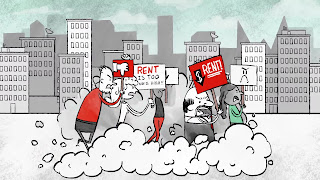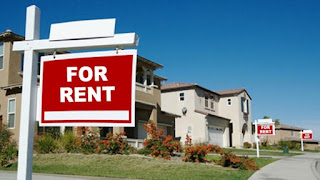Everybody makes mistakes from time to time in their lives…..even landlords. There’s no shame to it. However, a landlord can make fewer and less costly mistakes if he/she is careful to avoid these 10 mistakes.
1.
Incomplete or inadequate tenant screening
The tenant you place in your home will either make you a happy, profitable landlord, or a stressed, frantic landlord. Everyone’s perfect tenant usually has three of the same qualities. They pay rent on time, they take care of the property, and they follow the terms of the lease. You also want a tenant who is willing to stay in the property for a long time and is able to communicate any questions, maintenance problems, or concerns in a timely manner.
Many landlords glance at an application and maybe run a credit check before approving a tenant for their property. You have to dig a little deeper than that if you want to be sure you’re getting a great tenant.
If you fail to do a thorough tenant screening, you could end up with a tenant who has prior evictions, a history of damaging rental homes, or a problem keeping jobs. It takes time to screen tenants, especially if you’re a landlord doing it yourself. But, not screening tenants is one of the worst mistakes you can make.
The elements of a thorough tenant screening include a few important things:
- Credit history. Ignore the credit score and focus on whether the prospective tenant pays utility bills and meets other financial obligations. Make sure you don’t see any outstanding debts to previous landlords or management companies.
- Criminal history. Recent felonies or a history of violent behavior is problematic. Check everything from the terrorist watch list to the sexual predator database.
- Employment and income. You want a tenant who earns at least three times the amount of rent. Talk to employers and ask for pay stubs.
- Landlord references. Ask previous and current landlords about the tenant and whether they would be willing to rent to that person again.
- If your prospective tenant is a parent whose child or children don’t live with them full time, are they current with their child support? If their paycheck is garnished, where will your rent come from?
- Do they like to party? Check their Facebook, Twitter and Instagram accounts.
2.
Failing to perform a thorough Move-in and Move-Out Inspection
Before your tenant moves in, you need to conduct a move-in inspection. This is where you go through the property, room by room and closet by closet, and you document its condition. This is not only an important step in making sure the property is ready to rent but it also gives you the opportunity to demonstrate what the property looked like when you handed over the keys.
Make detailed notes and take a lot of pictures. No detail is too small. Photograph the condition of paint and appliances. Take pictures of floors, windows, ceilings – everything. At the end of the lease term, you’ll also conduct a move-out inspection. This will allow you to compare the move-in condition to the move-out condition.
This is important because if there’s damage that you want to charge the security deposit for, you’ll have to prove that the damage wasn’t there before your tenant moved in. Judges aren’t going to take your word for it. If you withhold $200 from a security deposit to fix a wall that has a gaping hole in it, you’ll need to show a picture of that wall without the hole before your tenant moved in, and a picture of the same wall with the hole when your tenant moved out. It’s a mistake not to do this because you’ll end up spending money on repairs that should have been the tenant’s responsibility.
3.
Lack of Legal Knowledge
Unless you’re a lawyer, you probably don’t spend a lot of time keeping up with legal changes and regulatory requirements. But, if you’re a landlord renting out property, there are a few things you need to be aware of, otherwise, you could find yourself embroiled in a lawsuit.
There are federal laws such as the Fair Housing Act and the Americans with Disabilities Act which impact how you rent out your property and to whom. Not following these laws can cost you thousands of dollars.
It’s easy to make an unintentional fair housing mistake. When landlords advertise their properties and choose tenants, they often don’t think about how their words, questions, and decisions can look to federal agencies such as the Department of Housing and Urban Development. Landlords often make the mistake of not screening all applicants consistently. You should have a written set of procedures so you can show your process of choosing a tenant to anyone who asks. Establish a list of criteria and hand that out to every applicant so that your requirements are in writing and non-negotiable.
Service animals and emotional support animals are not pets. You cannot deny someone with a documented service animal because you have a no-pet policy. This will get you in a lot of legal trouble. You cannot allow a documented emotional support animal and then charge a pet deposit or extra pet rent. It’s a violation of federal law. However, the tenant must have documentation from the appropriate source that clearly states the animal is a required service or emotional support animal. This documentation should become a permanent part of the tenant’s file. In other words, if you don’t know the laws, you could make some very serious and costly mistakes.
There are also state requirements to be considered in addition to Federal requirements. Further, some municipalities also have their own set of additional requirements of which you should be familiar.
You need to know as much about the landlord and tenant laws as you can in order to avoid disputes, lawsuits, and claims. Don’t make the mistake of thinking you don’t have to worry about these things.
4.
Inconsistent Rent Collections
Tenants who don’t pay rent on time are a huge problem. As a landlord, you probably want to be a nice person. That’s admirable. However, this is a business, not a social networking opportunity. In other words, you’re not doing this in order to make new friends. Your rental property (or rental properties) need to be viewed as a business because that’s what it is. It’s an investment that needs to bring you a regular income. When tenants are late with rent payments, your cash flow is disrupted. It’s a mistake to be laid back about rental payments.
Make sure your lease is clear about when rent is due, how much is due, and how it’s expected to be paid. The lease should also reference any late fees and other consequences that are part of your rent collection policy. Then, you have to enforce this part of the lease.
When you allow tenants to pay whenever they feel like it, you’re setting a dangerous standard. What if the tenants stop paying altogether? You might find yourself having to evict them, and if you’ve been inconsistent with your rent collection up to that point, getting them to meet their obligations or leave your property will be difficult.
Don’t get emotionally involved with your tenants. They will have excuses and stories about why rent is not paid on time, and some of them might even be true. But it’s your responsibility to get the rent in on time so you can meet your own obligations. If you have trouble enforcing your lease and consistently collecting rent, turn it over to a professional property manager so you don’t end up losing money or your property.
5.
Deferring Property Maintenance
Maintenance can be expensive, and if you don’t have relationships in place already with some great vendors and contractors, it can be a struggle to coordinate. However, it’s a fact that your rental property will need maintenance and repairs at some point. Some landlords put those things off, which is a mistake. You absolutely must be responsive to maintenance needs. You have to be thorough and proactive.
Preventative maintenance preserves the condition of your property and keeps it increasing in value. If you begin to ignore the small maintenance problems like leaks under the sinks or a hot water heater that leaks “just a little bit now and again”, you’re going to end up with bigger, more complicated and more expensive repairs in the future. You’re also going to compromise the integrity of your property.
It will be difficult to increase rent or to keep good tenants in the property if it’s falling apart. A badly maintained property has a negative impact on your tenants. Your current tenants will move out as soon as they have the chance if their repair requests go unanswered.
You should also know that if you want to sell the property down the road, you can bet you won’t get anywhere near the money you might want for it if it’s not properly maintained.
6.
Weak or Illegal Lease
It is well worth the time and money to get a licensed attorney who is experienced in both real estate and contract laws within your state to draft a strong and legal lease. While it will be an upfront expense, this is a lease that you can use over and over so it will more than make up for the expense involved over time.
What is an “illegal” lease, you might ask? An illegal lease is one in which the lease ask the tenant to do, or not do, something that isn’t allowed under the law. An example would be if you put in your lease that the tenant could not become pregnant and have a child while she lived in your unit. There was a time when landlords could refuse to rent to an adult with children. No longer is that the case. What if you include wording in the lease that states the tenant cannot have lights on past 8 p.m.? If you said this would be unenforceable, you’d be right.
Another example of an illegal lease is one that while detailing what the landlord expects from the tenant doesn’t include details of what the tenant can expect from the landlord. A contract can be declared null and void if there is no give and take written into it. There is no such thing as a one-sided contract. You must include what the landlord expects from the tenant AND what the tenant should expect from the landlord in order for it to be considered a legal and binding contract.
A strong lease will be very detailed as to the exact conditions of the lease. Better to include too much detail as too little. As an example, if you don’t want bikes stored in the breezeways but fail to include that in the lease, you may find it difficult to enforce that rule down the road or if you don’t want grills used on covered patios, that needs to be in the lease. If you don’t allow non-working vehicles parked at the property, then include that in your lease. It doesn’t matter if all of these items don’t apply to each and every tenant that you have or will have. However, if you don’t include them in the lease and it does apply to even one tenant, that tenant can legally claim not to have broken their lease when you try to enforce the “rule”. The stronger your lease, the more protected you are.
Perhaps the most common excuse a tenant will have for violating a term of the lease is the “I didn’t know” excuse. That’s why it is imperative to sit down with the tenant(s) and go over each and every word of the lease with them. Have them initial each paragraph as you have read and explained it to them. Answer any questions they may have at that moment. Getting them to initial each paragraph will go a long way to prove that they did indeed know and it will blow that excuse right out of the water. Taking 10 minutes upfront to read the lease in its entirety and have them initial each paragraph before they sign the lease will save you countless hours down the road.
It’s great to get your property rented as quickly as possible. However, you should never advertise a property for rent until it’s ready to occupy. Jumping the gun and allowing prospective tenants to tour the rental before it’s completely done, will turn them off quicker than it will excite them. There are a few exceptions, like with anything else, but the vast majority of people will hear the price and see the condition and not be able to reconcile the fact that the price is based upon the finished product, not the current product.
Be patient and if someone should drive past your house while the workers are there and want to come inside to take a peek, nicely explain that you would be happy to take their name and number and call them once the work is completed.
Never show it to them before you’re done.
8.
Not responding timely – being a Mystery Landlord
Everyone loves a good mystery and being mysterious is intriguing. However, no one wants a mystery landlord. Make sure your tenant(s) know how to contact you. Make sure they know who to call at 3 in the morning during a hard rain when the roof is leaking or at 2 pm on Christmas afternoon when the basement is flooded. Maybe you don’t want them waking you from your sleep or interrupting your Christmas Day festivities, but make sure they have the phone number of someone who can take care of it. Not losing sleep is a perfect reason to hire a reputable property management company. They have emergency numbers to call for these things. Your sleep remains uninterrupted and they get their issue resolved. Win-win.
I would venture to say that more business disputes are caused because the unhappy customer (or tenant in this situation) feels they have been inconvenienced or wronged and the business (or landlord) either responds in anger or doesn’t respond at all. More lawsuits are filed for this reason than for any other.
As with any business that deals with the public, a landlord must be a good ambassador for their business. Even if you feel their complaint is trivial….it’s not to them or they wouldn’t be so upset about it. A sincere apology goes a long long way in diffusing potentially volatile situations. Even if you don’t believe you did anything wrong a simple “I’m so sorry this happened. What can I do to make it better” can oftentimes save a landlord from a lot of ugliness.
9.
There is a difference between Raising the Rent and Jacking up the Rent
Some states have laws in place as to how much a landlord can raise the rent and when. If your tenant has a one year lease in place, you cannot legally raise their rent until the lease is over. Having said that, it is extremely wise for you to study the neighborhood in which your property is located. If the neighborhood normally rents within the range (example) of $500 to $800 per month, charging $1,100 for your property is not a good idea. You can trust me when I tell you that during the life of their lease, your tenant will discover this fact and when their lease if over, they will be gone.
The same can be said for raising the rent by $300 when their lease is up. Raising the rent is fine but $300 a month is jacking up the rent. The only exception to this, is if you have gone in and totally rehabbed the property to justify the $300 a month increase.
10.
Not Offering Specials in a Soft Market
You don’t have to own a large apartment complex to offer a rent special. Moving is expensive and anything you can do to make it less expensive is majorly attractive to a potential tenant. If a tenant has looked at a property that is similarly priced, similar in appearance and amenities as yours but you are offering a move-in special, they’re going to take yours.
Move-in specials don’t have to break the bank. My favorite is the free month with a 13-month lease. They don’t get that free month until the 13th month. Another good one is one month free but it’s spread out over 2, 3 or even 4 months.
If rentals are in large demand in your area, your property is located right with great amenities and it’s in great condition, then it’s not necessary to offer a special. But if there are other properties for rent like yours and priced near to yours in the neighborhood, a good move-in special could make you stand out from the crowd.










